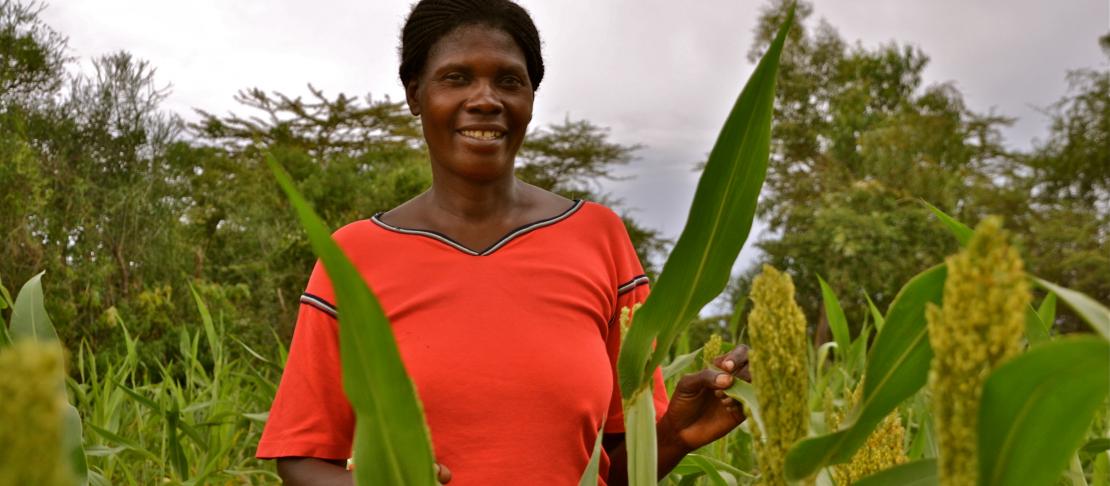Creating a hospitable environment for accessible and resilient food systems in East Africa through the Climate Resilient Agribusiness for Tomorrow (CRAFT) project

Climate change and related climate variability present a challenge for agricultural production systems and food security in East Africa.
The increased frequency and intensity of floods and droughts, combined with a rising population, further jeopardize the livelihoods of millions of smallholder farmers in the region. Agricultural stakeholders require integrating climate-smart solutions and innovations that can be adopted and scaled for inclusive regional agribusiness development. Multistakeholder engagement from research, development, and private partners could facilitate best practices and technologies and catalyze positive change in East Africa's agribusiness landscape.
Kenya, Tanzania, and Uganda have successfully integrated adaptation, resilience, and mitigation into national agricultural policies. However, the potential for adopting resilience-building practices and climate change adaptation and mitigation is hampered by various gaps and barriers. These include low yield and productivity, inadequate institutional environments, limited knowledge and skills, and unaffordable and inaccessible climate-resilient inputs.
THE CRAFT PROJECT
The Climate Resilient Agribusiness for Tomorrow (CRAFT) project was designed to address climate change related challenges affecting the agriculture sector in Kenya, Tanzania, and Uganda. Launched in 2018, the five-year CRAFT project obtains funding from the Netherlands Ministry of Foreign Affairs. It is implemented by a consortium that includes SNV Netherlands Development Organisation in partnership with Wageningen University and Research, CGIAR's Research Program on Climate Change, Agriculture and Food Security (CCAFS), Agriterra, and Rabo Partnerships.
Critical success factors for enhancing adaptation and resilience with mitigation co-benefits include knowledge, information, services, appropriate technologies, capacity building, a blend of financial instruments, and enabling policy environments and institutions. In this respect, CRAFT provides performance-based grants to the private sector through its Climate Innovation and Investment Facility (CIIF). The key beneficiaries include SMEs, cooperatives, and their contracted farmers. By the end of 2020, 36 business cases with 237,250 farmers targeted outreach received a commitment of over €33.7 million, of which €5.6 million is provided by CRAFT.
The role of this new, innovative partnership offers a solid platform to manage and coordinate robust climate-smart agriculture (CSA) projects and to provide targeted technical assistance, business facilitation, and research and knowledge management support. CRAFT's intervention is embedded in inclusive and climate-responsive investments – in other words, supporting smallholder farmers throughout the value chain, including climate-smart practices in production, harvesting, post-harvest handling, and marketing access. In order to strengthen business performances of agribusiness and cooperatives, seven value chains in the three countries have been a focus of the project that includes green grams, potato, beans, sesame, sunflower, soybean, and sorghum.
A Unique Approach to Agriculture
CRAFT also fosters a unique approach, enabling small and medium-sized enterprises (SMEs) to champion climate-resilient agriculture in East Africa. The contract farming between businesses and smallholder farmers will revitalize and facilitate access to input and output markets for agricultural services and products, thereby providing multiple benefits to all actors along the agriculture value chain. This model is a positive institutional innovation in marketing, filling gaps that would otherwise cause market failure and incentivizing the adoption of climate services.
The synergy of climate resilience and Farmer Field School (FFS) methodologies, known as CR-FFS, is integral to CRAFT's inclusive and innovative business model. Given this, building the capacity of critical resources to integrate these two concepts has been crucial. Key stakeholders have included farmers, small and medium-sized enterprises (SME) employees, and public extension agents.
Using the FFS approach and validated CSA practices, farmers are better equipped to manage the climate-related stresses while enhancing their yields and income at the same time. Close to 81,000 farmers are currently registered, while 41,290 (47% female) were trained in CSA practices and technologies.
Climate-Risk Assessments
In CRAFT implementation countries, climate risk assessment methodology explores what climate risks different actors, resources, and processes along a value chain face and identifies suitable adaptation strategies that can help lower these risks. The role of CCAFS is mainly in identifying the climatic risk for each value chain. Wageningen Environmental Research assesses the impact of those risks in agriculture. Together with SNV, all partners have identified the adaptation mechanisms to those risks.
Climate variables such as rainfall and maximum, minimum, and mean temperatures were analyzed for each value chain. During climate risk assessment workshops across the three countries, farmers identified the need for timely information and knowledge to help adjust their farming practices – including information about accessing quality certified seeds, soil testing before selecting fertilizers, or finances and markets. For the agri-businesses (processors, input, and service providers), the farmers' challenges reflected the need to invest in climate-smart solutions to climate-proof their supply chains. The participating financial institutions realized a need to develop customized products for farmers, including making agricultural insurance accessible and affordable to farmers.
In identifying significant institutional and socio-economic barriers, a range of relevant actors, including national and regional government agencies, extension services, researchers, meteorological services, and financial service providers, were engaged. Although CRAFT was meant to have its implementation year in 2020, the COVID-19 pandemic affected project activities and partners' engagement in the business operation. Through a COVID-19 response facility, the project supported the businesses in responding to issues related to the pandemic, which assisted smallholder farmers, cooperatives, and agribusinesses cope with the impact of the pandemic. The support consisted of adding digital services to reach the farmers in business plans, integrating adequate sanitation and protective gear within the roll-out, and adjusting investment plans to the changing business environment.


